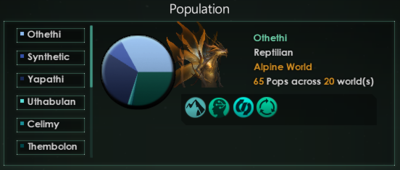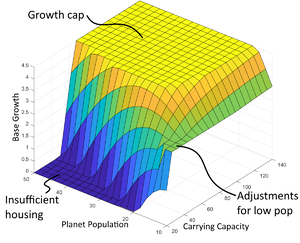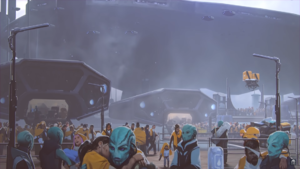(merge from offical wiki) |
小 (文本替换 - 替换“Category:Game concepts”为“Category:游戏概念”) |
||
| 第562行: | 第562行: | ||
{{ConceptsNavbox}} | {{ConceptsNavbox}} | ||
[[Category: | [[Category: 游戏概念]] | ||
[[Category:Governance]] | [[Category:Governance]] | ||
2022年3月7日 (一) 13:27的版本
| 人口 may need to be updated. Please update this article to reflect recent events or newly available information, and remove this template when finished. Please see the talk page for more information. |
Population, also known as ![]()
![]() Jobs created by
Jobs created by ![]()
![]()
![]()
![]()
Demographics
Each planet has four variables that determine its demographic direction. A planet can have only one growing pop, one declining pop and one assembling pop at any time.
![]() Pop growth represents the increase in population from natural reproduction and immigration. A new pop appears after [math]\displaystyle{ 100 + (\text{growth required scaling} \cdot {\text{total empire population}}) }[/math] growth points have been accumulated; the growth required scaling is a game setting. The base growth rate is determined by the
Pop growth represents the increase in population from natural reproduction and immigration. A new pop appears after [math]\displaystyle{ 100 + (\text{growth required scaling} \cdot {\text{total empire population}}) }[/math] growth points have been accumulated; the growth required scaling is a game setting. The base growth rate is determined by the ![]() Planet Capacity of the planet and the number of pops on the planet, and then pop growth modifiers are applied, and lastly pop growth from immigration/emigration is added/subtracted. The logistic growth ceiling game setting determines the maximum base growth.
Planet Capacity of the planet and the number of pops on the planet, and then pop growth modifiers are applied, and lastly pop growth from immigration/emigration is added/subtracted. The logistic growth ceiling game setting determines the maximum base growth.
Any species existing on the planet or which has immigration access to the planet may be selected to grow there. When choosing a species to grow, planets will generally prioritize species that are under-represented on the planet and have citizenship equal to that of the already existing species. If immigration access is lost to all planets containing the currently selected species, a new species will be selected and all existing growth progress will be erased. Species can be chosen manually for growth if the Population Controls policy is set to Allowed.
![]()
Pop growth stops when a planet is 15% overcrowded and has 5 Pops without Housing. Pops start to decline when a planet is 25% overcrowded.
![]() Planet Capacity is capped at 500, regardless of free housing or unblocked districts. However, Pops over 500 will not stop growing or decline until required housing exceeds available housing by 15% or 25%, as normal.
Planet Capacity is capped at 500, regardless of free housing or unblocked districts. However, Pops over 500 will not stop growing or decline until required housing exceeds available housing by 15% or 25%, as normal.
| Base population growth formulas | |
|---|---|
| Condition | Formula |
| [math]\displaystyle{ \frac{{\text{planet capacity}}}{2} \gt {\text{planet population}} }[/math] | [math]\displaystyle{ \text{total base growth} = 3 \cdot \max (0.125 \cdot (\text{population} - \frac{\text{population}^2}{\text{planet capacity}} - 1) , 1) }[/math] |
| [math]\displaystyle{ \frac{{\text{planet capacity}}}{2} \le {\text{planet population}} }[/math] | [math]\displaystyle{ \text{total base growth} = 3 \cdot 0.125 \cdot (\text{population} - \frac{\text{population}^2}{\text{planet capacity}} - 1) }[/math] |
With total base pop growth between 0.3 and [math]\displaystyle{ (\text{logistic growth ceiling} \cdot 3) }[/math] (default 4.5) growth per month. Pop growth modifiers, including habitability penalties, are then applied, and then population growth from immigration/emigration is added/subtracted.
Pop decline represents the decrease of certain species on the planet due to purging or severe overcrowding. A pop will disappear after 100 decline points have been accumulated. By default, decline rate is −5 decline points per month. Overcrowded planets that have over-represented species will have those species begin to decline in numbers and be replaced by newly growing, under-represented species that have equal citizenship. Purging a particular species will cause that species to decline more rapidly depending on the purge species right.
Pop assembly represents a planet's capacity for constructing ![]()
![]()

机器人专家 Jobs add +2 Monthly Robot Pop Assembly Points
复制者 Jobs add +1 Monthly Robot Pop Assembly Points- Robotic Pop Assembly is affected by traits and other modifiers

繁殖工蜂 Jobs add +2 Monthly Biological Pop Assembly Points
克隆仓 buildings add +3 Monthly Biological Pop Assembly Points Ancient Clone Vat buildings add +2 to +15 Monthly Biological Pop Assembly Points
Ancient Clone Vat buildings add +2 to +15 Monthly Biological Pop Assembly Points- Biological Pop Assembly is not affected by any traits or modifiers except for the following:
Migration
Migration is calculated by subtracting emigration push from immigration pull, both of which are determined by factors such as ![]()
![]()
![]() Unemployment. A planet with more emigration than immigration will have its
Unemployment. A planet with more emigration than immigration will have its ![]() growth speed lowered and the amount lowered will be added to potential immigration targets. Planets with higher immigration pull will receive a greater share of this migration, which is converted directly into pop growth. Signing a
growth speed lowered and the amount lowered will be added to potential immigration targets. Planets with higher immigration pull will receive a greater share of this migration, which is converted directly into pop growth. Signing a ![]()
![]() 15 years have passed or the colony has 10
15 years have passed or the colony has 10 ![]() Pops.
Pops.
Growth weight
The exact mechanics by which a new pop is selected for growing/assembly is not fully known. However a bunch of values can be extracted from the Stellaris/common/defines/00_defines.txt file.
| Name | Value | Description |
|---|---|---|
| New_Pop_Species_Randomness | 0.5 | The higher this is, the more random species selection of new pops will be |
| New_Pop_Same_Species_Weight | 1.0 | The higher this is, the more new pops will be weighted by number of same or subspecies pops |
| New_Pop_Exact_Species_Weight | 0.5 | The higher this is, the more new pops will be weighted by number of exact same species pops |
| New_Pop_Slavery_Weight | 0.25 | The higher this is, the more new pops will tend to be balanced between enslaved and non-enslaved species |
| New_Pop_Species_Div | 0.05 | The higher this is, the more planets will tend to grow species that are underrepresented on the planet |
| New_Pop_Habitability_Threshold | 0.75 | If habitability is under this, apply exponentially increasing penalties to new pop weight |
| New_Pop_Homeworld_Mult | 2 | Pops have increased weight for growing on their homeworld |
| New_Pop_Growth_Mod_Mult | 0.33 | How much does species growth mod trait matter for new pop weight |
| NEW_POP_Immigration_Mod_Mult | 1 | How much does species immigration growth mod trait matter for new pop weight (when there is immigration) |
| Pop_Decline_Threshold | 3.0 | A species will decline when there is another species with a growth priority this many times higher |
Resettlement
Resettlement is the process of pops moving from one planet to another, more desirable one.
Forced resettlement
If the empire's policies allow it, forced resettlement will instantly move a pop from one planet to another. This costs an amount of ![]()
![]()
| Source | Cost | |
|---|---|---|
| −50% | ||
| −33% | ||
| −33% | ||
| +0% | −100% | |
| −25% | ||
| −25% | ||
| +25% | ||
| −50% | −100% | |
Automatic resettlement
Sapient, unemployed, free pops have a chance (each month) to automatically resettle to another planet with available jobs and housing and suitable habitability. If a ![]()
![]()
A ![]()
Happiness
Each pop in an empire has a ![]()
![]()
- Each point of Happiness above 50 adds +1%

主流思潮吸引力 to free pops and +2%
威权主义 ethics attraction to slaves. - Each point of happiness below 50 adds −1%

主流思潮吸引力 to free pops and +10%
平等主义 ethics attraction to slaves. - Each point of happiness above 50 gives each pop −0.02

犯罪与异常 , up to 0 per pop at 100% happiness. - Each point of Happiness below 50 gives each pop +0.02

犯罪与异常 , up to +2 per pop at 0% happiness.
Fortunately, there are many ways to improve happiness in an empire. Planetary ![]()
![]()
![]()
![]()
![]() ruler traits can positively affect happiness. Events may have an impact on planetary or empire happiness for a limited time as well.
ruler traits can positively affect happiness. Events may have an impact on planetary or empire happiness for a limited time as well.
Approval rating
Pop approval rating is a measure of the population's support towards the empire. It is determined by the average ![]()
![]()
Approval rating ranges from 0% to 100% and has a base level of 50%.
- Each point of approval rating above 50% adds +0.6

稳定度 , up to +30 at 100% approval rating. - Each point of approval rating below 50% adds −1

稳定度 , up to −50 at 0% approval rating.
Upkeep
Most organic pops consume ![]() 1
1 ![]()
![]() 1
1 ![]() Robots instead consume
Robots instead consume ![]() 1
1 ![]()
![]()
Pops with the ![]()
![]()
![]()
![]()
Housing
![]()
![]()
![]()
As a rule of thumb, each resource district exactly pays for itself in terms of housing, while the pops that work building jobs need city districts (or housing buildings) for their housing, though the capital building provides some buffer before cities are needed. This applies equally to ![]()
![]()
Amenities
![]()
![]()
![]()
![]()
![]()
The formula for extra amenities contributing ![]()
The formula for missing amenities contributing ![]()
Amenities can be affected on an empire-wide basis by the following:
| Source | Amenities usage |
|---|---|
| −10% | |
| −10% | |
| −5% | |
| +25% |
Stratum
Strata represent pops' social classes. The higher a pop's stratum, the more political power they have and the more ![]()
![]()
![]()
![]()
![]()
If a pop takes a job above its stratum it will be promoted to the higher stratum. If there are no available jobs of equal or higher Stratum the pop will become unemployed, slowly demoting in stratum and causing ![]()
![]()
Slavery
Entire species can be enslaved by giving them a certain citizenship, which opens a new tab in the Species Rights menu called Slavery Type that determines what are the effects of slavery.
Enslaved pops also use only ![]() 0.75 amenities and
0.75 amenities and ![]() 0.75 housing (instead of 1), which can be further reduced if the
0.75 housing (instead of 1), which can be further reduced if the ![]()
![]()
![]()
![]()
Low ![]()
Slave output can be affected by the following:
Slaves, Workers and Specialists
In addition to the Slave resource output modifiers, Worker resource output modifiers can also affect Slaves in worker jobs. As of 3.0.1 Slaves in Specialists jobs are affected by specialist output modifiers but not by Slave resource output modifiers, if in Indentured Servitude.
If a modifier affects the resource output of both Workers and Slaves, it actually affect Slaves in Worker jobs twice.
- The
 Extended Shifts edict increases Slaves resource output by +10% and Workers resource output by +10%, resulting in an actual +20% bonus to Slaves in worker jobs.
Extended Shifts edict increases Slaves resource output by +10% and Workers resource output by +10%, resulting in an actual +20% bonus to Slaves in worker jobs.
Modifiers that affect Workers aside from the resource output ones don't affect Slaves.
- The
 Extended Shifts edict decreases Slaves happiness by −10% and Worker happiness by −10%. It does NOT cause the Slaves to suffer −20% happiness.
Extended Shifts edict decreases Slaves happiness by −10% and Worker happiness by −10%. It does NOT cause the Slaves to suffer −20% happiness.
Ethics attraction modifiers
![]()
Each pop in an empire will only embrace a single, non-fanatic ethic. At the start of the game, the population will be made of the empire's governing ethics. As population expands and eventually is divided over various planets and sectors, certain segments may decide to adopt values that are different from the core values of the species due to various circumstances in and around the empire.
Each ethic has a certain attraction value attached for all pops, depending on both the empire's situation and their own. Each pop can only switch ethics once per year. The exact values and options that influence the attraction levels of certain ethics can be found at Ethics attraction. The attraction factors of ethics can be amplified by certain circumstances such as policies or traits.
Having a positive ethics attraction effect will let all actions that increase attraction to the government ethics result in even more attraction, and negative amounts will be decreased. With a modifier of 50%, an action that would increase attraction by 2 would instead increase by 3.
Hovering over a pop's ethic will display the attraction towards all ethics.
Robots
Robots are artificial pops and can be constructed once the required technology becomes available. They have the ![]()
![]() +200% habitability on any planet. Robots can be given new traits via robo-modding, and the species template with the highest number of used trait points will be built by default. A different template can be specified for each planet.
+200% habitability on any planet. Robots can be given new traits via robo-modding, and the species template with the highest number of used trait points will be built by default. A different template can be specified for each planet.
The jobs a robot can have are limited by the highest robot technology researched. If an empire researches the ![]()
![]()
| Tech level | Maximum stratum | Can colonize | Sapient |
|---|---|---|---|
|
Robots without Citizen Rights require 50% less ![]()
![]()
![]()
![]() Synthetics technology, they lose their sapience, and if a planet with non-sapient robots is captured by an empire that has the
Synthetics technology, they lose their sapience, and if a planet with non-sapient robots is captured by an empire that has the ![]() Synthetics technology and does not have the Outlawed Artificial Intelligence policy, they are immediately given sapience. Note that non-sapient robots can do all specialist jobs with
Synthetics technology and does not have the Outlawed Artificial Intelligence policy, they are immediately given sapience. Note that non-sapient robots can do all specialist jobs with ![]() Droids tech, but not after researching
Droids tech, but not after researching ![]() Synthetics tech.
Synthetics tech.
|
|
只可用于 Utopia DLC 已启用。 |
- It's possible to take the
 Synthetic Evolution ascension perk and turn all organic Pops and leaders into Synthetics.
Synthetic Evolution ascension perk and turn all organic Pops and leaders into Synthetics. 
蜂巢思维 empires cannot build robots and will always purge all robots on their worlds.
|
|
只可用于 Synthetic Dawn DLC 已启用。 |
- As long as an empire has the Artificial Intelligence policy set to Servitude there is a risk of them starting an AI rebellion.

机械智能 empires cannot build robots but they can use them if conquered from a regular empire or bought on the slave market. Robots in a Machine Intelligence empire can work all jobs and are not affected by happiness.
Purges
![]() 、
、 ![]()
Targeted pop purging still requires applying the species-wide ![]() slavery at minimum and it is limited to a basic extermination, although without production penalty.
slavery at minimum and it is limited to a basic extermination, although without production penalty. ![]()
![]() Bio-Trophies.
Bio-Trophies.
Species-wide purging is done by setting the species' ![]()
![]()
![]()
![]()
- Pre-Sapients can only be purged if the
 Pre-Sapients policy is not set to Protected and they are automatically purged if it's set to Extermination.
Pre-Sapients policy is not set to Protected and they are automatically purged if it's set to Extermination. - Robots are automatically purged if the
 Robotic Workers policy is set to Outlawed.
Robotic Workers policy is set to Outlawed. - Synthetics can only be purged if the
 Artificial Intelligence policy is not set to Citizen Rights.
Artificial Intelligence policy is not set to Citizen Rights. - Empires with the

掌控进化 ascension perk can change the citizenship of hive mind pops to
同化 , which prevents them from being purged.
Having any species-wide purge is a negative issue for Xenophile factions, aside from the case of ![]()
Each planet has a purge timer and it progresses depending on the purge type. When the timer runs out, an undesirable pop on the planet will be killed or displaced. ![]()
![]()
- All empires that have the same primary species as the purged pop will have their

评价 of the purger reduced by −25 per pop, to a maximum of −1000. - All other empires that have

 Egalitarian or
Egalitarian or 
 Xenophile ethics and don't allow species-wide purges will also have their opinion of the purger reduced by −5~10 per pop, to a maximum of −1000.
Xenophile ethics and don't allow species-wide purges will also have their opinion of the purger reduced by −5~10 per pop, to a maximum of −1000.
There are multiple types of purges available, determined by the ![]()
Refugees
Pops from other empires may flee to escape purges, slavery, resettlement, crisis bombardment or as a result of land appropriation. Whether another empire is willing to accept those fleeing depends on its Refugees policy. Refugees will not head for empires where they have the Undesirables citizenship. Accepted refugee pops will get +20 ![]()
Once refugees are generated they will head for any empire that will accept them with their Refugees policy following the following order:

宜居性 at least 70% and
住房 at least 1
宜居性 at least 70%
宜居性 at least 50% and
住房 at least 1
宜居性 at least 50%
宜居性 at least 20% and
住房 at least 1
宜居性 at least 20%
住房 at least 1- Any other planet
Pops with the ![]()
![]()
References
| 治理 | 帝国 • 思潮 • 政府 • 国民理念 • 政策 • 法令 • 领袖 • 派系 • 人口 • 物种权利 • 经济 • 科技 • 传统 • 犯罪率 |
| 探索 | 探索 • 地图 • 物种 • 异常现象 • 事件 • FTL • 失落帝国 • 前超光速物种 • 先驱者 • 太空生命体 |
| 殖民 | 殖民 • 天体 • 行星特征 • 行星管理 • 区划 • 建筑 • 舰船 • 恒星基地 • 巨型结构 |
| 外交 | 外交 • 贸易 • 附属国 • 联邦 • 星海共同体 • AI 性格 • 情报 |
| 战争 | 战争 • 太空战 • 地面战 • 舰船设计器 |
| 其它 | 特质 • 环境改造 • 种群修饰 • 奴役 • 危机 • 预设帝国 • AI 玩家 • 彩蛋 |





